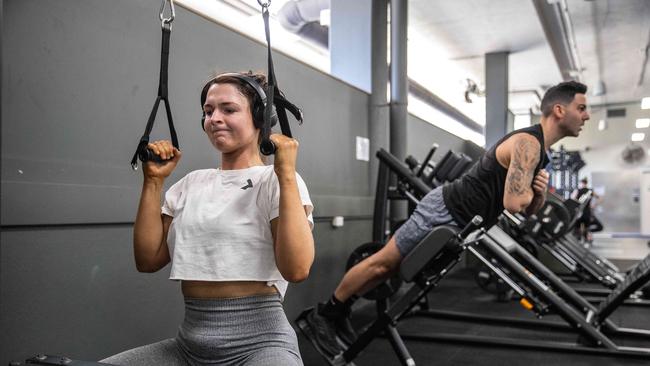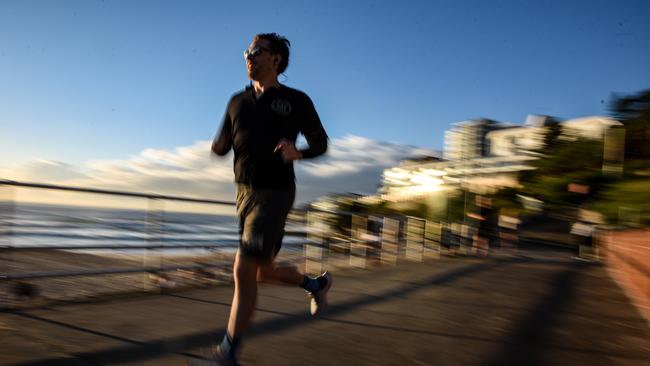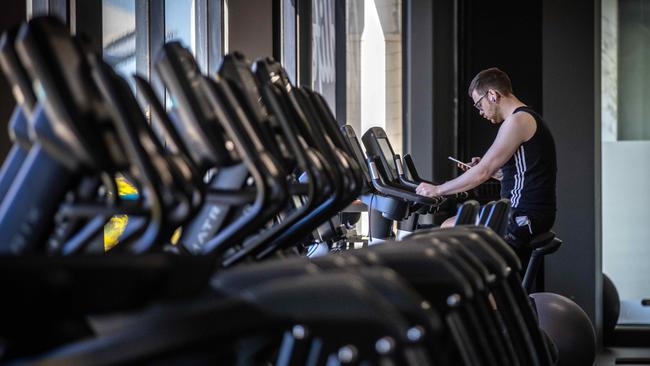How to get fit in 20 minutes
The latest research says 20 minutes of exercise a day, including running and cycling, is enough.

If your motivation to exercise is dipping along with the temperature, recent research could provide the impetus for you to keep trying, given its conclusion about when the magic happens in terms of health gains. It found that 20 minutes of exercise - brisk walking, jogging or cycling fast enough to make you breathe harder - each day leads to a reduction in disease risk and boosts your longevity.
The study, by researchers from Sweden and Norway, tracked on hip monitors the activity of nearly 12,000 people aged 50-plus for ten hours a day for at least two years. The findings of a five-year follow-up, published in the British Journal of Sports Medicine, showed that compared with eight hours of daily sitting, people who spent 12 hours in a seat had on average a 38 per cent increased risk of death during that period. But this was true only for participants who clocked up fewer than 22 minutes of daily activity.
Last month Jens Bangsbo, a professor of human physiology and exercise physiology at the University of Copenhagen, reported that a particular type of reduced-intensity workout - interval training involving running for 30 seconds at a slow pace, 20 seconds at a moderate pace and a 10-second burst at just less than full intensity - is as effective in improving health and fitness markers for the average person as traditional HIIT, which requires a flat-out, lung-busting sprint. The ultimate goal is to build up the repetitions to a total of 20 minutes, recovery breaks included, two to three times a week. Achieve that, he says, and - as his findings, published in the Scandinavian Journal of Medicine & Science in Sports, show - you are likely to have improvements in your blood pressure and cholesterol levels.
“In previous studies we have shown that the blood sugar levels of type 2 diabetes patients were also reduced with this approach, resulting in better blood glucose control,” Bangsbo says.

Another study, in 2017, conducted at the University of California San Diego School of Medicine, found that a 20-minute session of moderate exercise was sufficient to stimulate the immune system, producing a beneficial anti-inflammatory response in the body, considered important for reducing the risk of arthritis, fibromyalgia and conditions related to obesity. And last year 20 minutes of daily exercise was cited in Heart journal as the amount needed for people in their seventies to ward off heart disease by their eighties.
It’s what happens during 20 minutes of exercise that makes it such a potent dosage. “Hormonal message systems start to send responses to the body and brain about adapting to the exercise stimulus,” says Dr Mark Homer, a sports physiologist and senior lecturer in exercise science at Buckinghamshire New University. “Blood flow to the brain increases, which improves thinking and memory; insulin control improves as you contract some of the body’s largest muscles; and the amount of oxygen your body uses starts to rise, which improves cardiovascular health.” It’s also about enough time to elicit the “runner’s high”, the rush of endorphins and endocannabinoids that are released into the bloodstream and make us feel good.
Lisa Chow, a professor of medicine at the University of Minnesota, says 20 minutes of exercise allows for the body’s organ systems to release potent amounts of exerkines, what she describes as “the good stuff released in response to exercise”. Her studies, including one published in Nature last year, have linked them to reduced inflammation, the formation of new blood vessels and cell regeneration.
“Exerkines can be released quickly or slowly, and 20 minutes of exercise, even slightly less if of a higher intensity, can do it,” she says.
There is a caveat. If you normally work out for longer but are tempted to shrink your exercise to 20 minutes over winter you’ll need to ramp up the effort. Plus, if you do choose to minimise your workout in this way, it is important that you exercise regularly, Homer says. “Your body loves to rest, but only by introducing exercise you find challenging will it be able to adapt to make workouts feel easier over time. And if you struggle for motivation, there are many ways to make 20 minutes plenty enough. It’s a very good benchmark.”

TRY THE 10-20-30 APPROACH
Bangsbo’s form of interval training involves running for 30 seconds at a slow pace, 20 seconds at a moderate pace and 10 seconds as a hard, but not flat-out burst. And you can try the approach on a bike, rower or cross trainer. “Complete beginners should just increase their speed, gradually aiming for 75-80 per cent of maximum speed in the 10-second burst as they get fitter,” he says.
Each interval takes 1 minute to complete and is initially repeated 5 times. As you get fitter add additional 5-minute interval blocks, taking a 1 to 4-minute break between them. Ultimately aim to complete 4 of the 5-minute interval blocks. “Beginners will need to do 10-20-30 training twice a week, whereas moderately fit people can try three times a week,” Bangsbo says. The super-fit who are used to interval running can do up to 4 of the 10-20-30 training sessions a week.
LIFT WEIGHTS
One weekly 20-minute weights session is enough to boost muscle strength, according to a study led by James Steele, an associate professor of sport and exercise science at Solent University. For his fit20 study, published in the Research Quarterly for Exercise and Sport last year, Steele described how almost 15,000 participants aged 18-80 were tracked for seven years to show that muscle strength can be significantly improved with one 20-minute workout a week.
The approach involved six all-body weights exercises, including chest presses, lateral pulldowns and leg presses, with participants performing a single set of 5-6 repetitions with as heavy a weight as they could manage. Their body strength improved by 30-50 per cent in a year. “Fifty per cent is a substantial improvement in strength,” Steele says. “But even 30 per cent is a huge improvement that will likely impact people’s lives and health in a very positive way.”

TAKE A WALK
The important thing is to do more with your 20 minutes than you were doing previously, Homer says. “If that is as simple as adding a 20-minute daily walk it will bring benefits to your health,” he says. In a study published in Frontiers in Psychology psychologists at the University of Michigan asked people to spend 10 minutes or more walking in nature at least 3 times a week. They found that those who walked for 20 minutes had significantly reduced levels of the stress hormone cortisol.
“A walk will improve your mood and your motivation to do more as you get fitter,” Homer says. “If you can do it daily, even better.”
DO YOGA
If you need a mood boost on these dull, dark days try squeezing in 20 minutes of yoga. A single session that included a variety of seated, standing and lying yoga poses with contraction and relaxation of different muscle groups, as well as breathing or meditative exercises, was shown in a study at the University of Illinois to enhance memory, speed and focus of the brain, improving reaction times and scores in cognitive tasks more effectively than a treadmill walk or run of the same duration. “The breathing and meditative exercises aim at calming the mind and body and keeping distracting thoughts away while you focus on your body, posture or breath,” the researchers wrote.
GO FOR A RUN
You don’t need to run a marathon or even a 10km to improve fitness. “Little and often is the recipe for enhancing health through running or any form of exercise,” Homer says. “And 20 or even 10-minute runs a few times a week are a good starting point for many people.” The results of an Iowa State University study of 55,000 adults who jogged for 5-10 minutes a day had “markedly reduced risks” for all causes of death over a 15-year period.
THE TIMES






